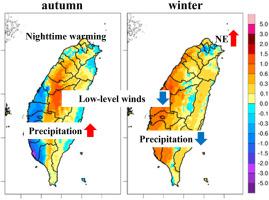当前位置:
X-MOL 学术
›
Atmos. Pollut. Res.
›
论文详情
Our official English website, www.x-mol.net, welcomes your feedback! (Note: you will need to create a separate account there.)
Climate change-induced impacts on PM2.5 in Taiwan under 2 and 4 °C global warming
Atmospheric Pollution Research ( IF 4.5 ) Pub Date : 2024-03-04 , DOI: 10.1016/j.apr.2024.102106 I-Chun Tsai , Pei-Rong Hsieh , Huang-Hsiung Hsu , Yu-Shiang Tung , Yung-Ming Chen , Chao-Tzuen Cheng
Atmospheric Pollution Research ( IF 4.5 ) Pub Date : 2024-03-04 , DOI: 10.1016/j.apr.2024.102106 I-Chun Tsai , Pei-Rong Hsieh , Huang-Hsiung Hsu , Yu-Shiang Tung , Yung-Ming Chen , Chao-Tzuen Cheng

|
Climate change can perturb meteorological parameters and affect air quality, human health, and the economy. This study examined the climate change-induced meteorological impacts on PM in Taiwan, an island with a dense population and complex topography. We conducted high-resolution simulations of the current and future climate using the National Center for Atmospheric Research's Weather Research and Forecasting model and the Community Multiscale Air Quality Modeling System. As verified by observations, the model could reproduce the spatial and seasonal characteristics of PM in Taiwan, including higher concentrations in cold seasons and lower concentrations in warm seasons. The number of polluted days in the current climate was more than 30 days per season in central Taiwan and more than 70 days in southern Taiwan in autumn and winter. Under the 2 °C and 4 °C global warming scenarios, climate change-induced impacts worsened the PM air quality in Taiwan in cold seasons. In winter, the number of polluted days increased by 3–6 days in the whole of Taiwan, while it decreased by 3–5 days in southern Taiwan in autumn. Analysis of climate change-induced impacts on northeasterly days, air stagnation, and ventilation indices revealed that the weaker low-level wind in cold seasons was the dominant factor of the worsened PM air quality under global warming in Taiwan. In addition, the climate change-induced worsening of PM air quality could be locally mitigated by northeasterly days and nighttime warming in urban areas in northern Taiwan and by precipitation in southern Taiwan. Overall, these findings indicated that climate change-induced impacts on air quality cover both urban and global scales. To better adapt to climate change, discussing interactions between the responses to global warming in urban areas using hierarchical models and high-resolution simulations is necessary.
更新日期:2024-03-04



























 京公网安备 11010802027423号
京公网安备 11010802027423号